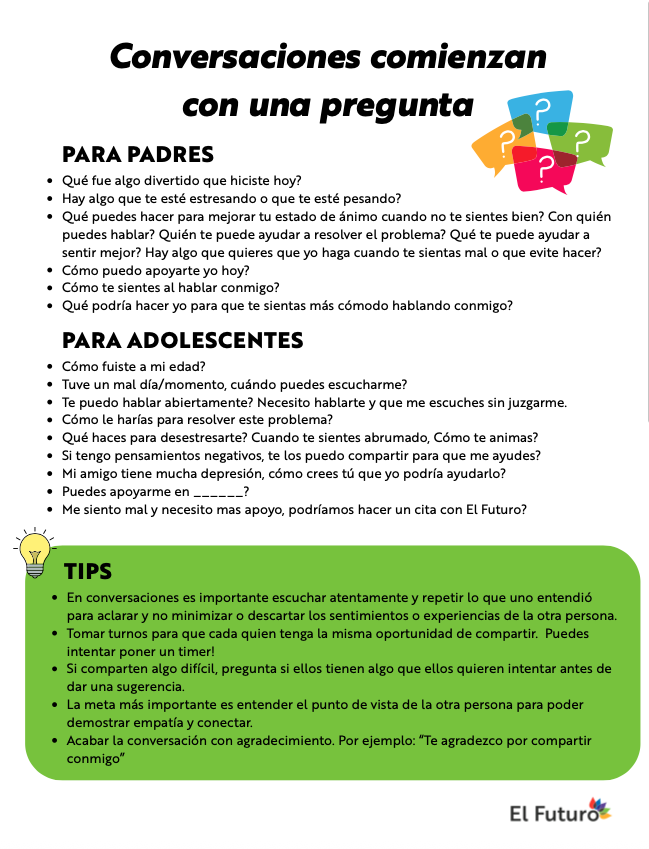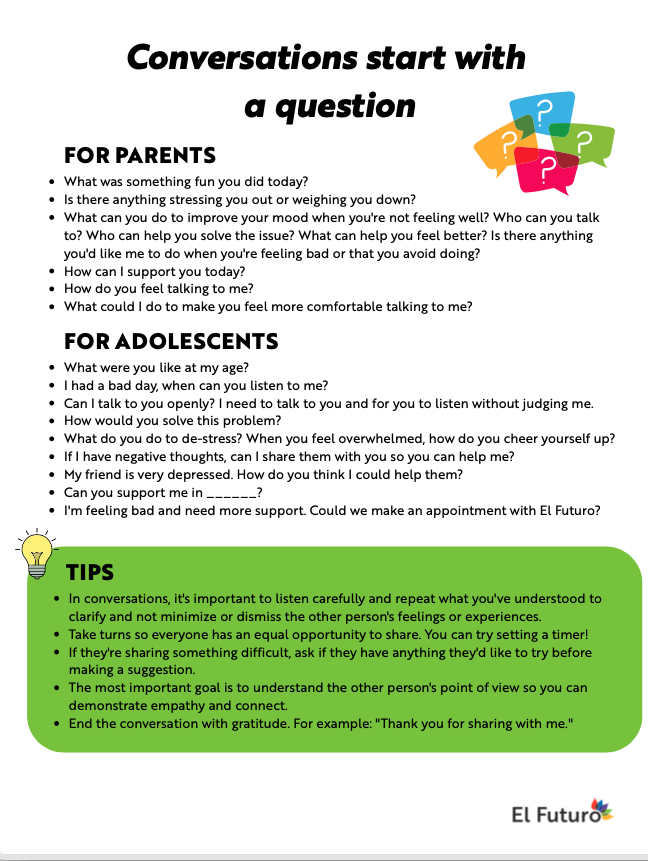 El Futuro is proud to share the results of Mi Voz, Nuestra Salud, a groundbreaking initiative funded by the Patient-Centered Outcomes Research Institute (PCORI®) through its Eugene Washington Engagement Award. This project gave Latine families, youth, and community leaders in North Carolina a platform to voice their priorities and shape the future of adolescent mental health care.
El Futuro is proud to share the results of Mi Voz, Nuestra Salud, a groundbreaking initiative funded by the Patient-Centered Outcomes Research Institute (PCORI®) through its Eugene Washington Engagement Award. This project gave Latine families, youth, and community leaders in North Carolina a platform to voice their priorities and shape the future of adolescent mental health care.
Who We Engaged: Over 18 months, El Futuro convened a Learning Collaborative of 19 participants, including:
- 6 Latine adolescents (ages 15–18)
- 3 parents of adolescents
- 3 Community Health Workers (CHWs)
- 4 community leaders
- 3 El Futuro staff members
- 2 Latine researchers from the University of Texas at Austin
Together, this diverse group shared lived experiences and professional insights, all with one goal: identifying solutions to the mental health crisis facing Latine youth, such as depression, trauma, anxiety, relationship with parents, and more.
Why It Matters
- 40% of Latine high school students nationwide report symptoms of depression.
- Families often face long waitlists for bilingual providers, financial barriers, and stigma around seeking mental health care.
- Community Mental Health Workers (CMHWs) offer a promising solution. They are trusted, bilingual community members who can bridge families to care, reduce stigma, and deliver culturally grounded support.
What We Learned: The Learning Collaborative identified clear priorities:
- Parent-Child Communication: The most critical factor for supporting teen mental health. Families need tools to talk openly about emotions and challenges without fear or stigma.
- Practical Skills: Teens and parents want training in emotion regulation, stress management, decision-making, and goal setting.
- Cultural Identity & Belonging: Youth thrive when their bicultural skills and ethnic identity are celebrated and supported.
- Healthy Routines: Sleep, nutrition, and balanced lifestyles are seen as protective factors against anxiety and depression.
- Access through CMHWs: CMHWs, who share families’ language and cultural background, can deliver interventions in schools, community centers, and faith-based settings.
Why This Should Matter
You play a vital role in transforming these findings into action. With your support and collaboration, El Futuro can:
- Develop and scale CMHW-led programs to reach more Latine families.
- Reduce stigma by equipping parents and teens with the language and confidence to discuss mental health.
- Address workforce shortages by training CMHWs as trusted mental health allies.
- Build resilience across generations, helping teens succeed academically, socially, and emotionally.
- This project demonstrates how listening to community voices leads to practical, culturally relevant solutions. Together, we can create sustainable programs that meet families where they are and ensure that Latine youth across North Carolina—and beyond—have the opportunity to thrive.
This project was funded through a Patient-Centered Outcomes Research Institute® (PCORI®) Eugene Washington Engagement Award (EACB-30340). The views expressed are those of the authors and not necessarily those of PCORI.
Start the Conversation




 Alvely Alcántara, LCSW
Alvely Alcántara, LCSW Rossy C. Garcia, MEd
Rossy C. Garcia, MEd  Katy Sims, MD
Katy Sims, MD  Everardo Aviles, LCSW, LCAS (Eve)
Everardo Aviles, LCSW, LCAS (Eve) As a medical anthropologist and social work researcher, Dr. Gulbas’ research embodies interdisciplinarity through the integration of applied theories of health and human development with qualitative and ethnographic methodologies. Her work seeks to understand how people—children, families, and providers—navigate complex sociocultural landscapes in the pursuit of mental health. Most of her work, to date, focuses attention on developing more robust interpretations of suicide risk. With funding from the National Institutes of Mental Health, this body of research has contributed to advancements in theoretical and empirical knowledge of the broader contexts within which youth suicide risk is situated.
As a medical anthropologist and social work researcher, Dr. Gulbas’ research embodies interdisciplinarity through the integration of applied theories of health and human development with qualitative and ethnographic methodologies. Her work seeks to understand how people—children, families, and providers—navigate complex sociocultural landscapes in the pursuit of mental health. Most of her work, to date, focuses attention on developing more robust interpretations of suicide risk. With funding from the National Institutes of Mental Health, this body of research has contributed to advancements in theoretical and empirical knowledge of the broader contexts within which youth suicide risk is situated.  R. Gabriela Barajas-Gonzalez is a developmental psychologist and an assistant professor of Population Health at NYU Grossman School of Medicine. Dr. Barajas-Gonzalez is the principal investigator of a study that examines the impact of immigration-related threat and stress on school communities. She earned a PhD in developmental psychology from Columbia University and hold a BA in human biology from Stanford University. Dr. Barajas-Gonzalez is the daughter of Mexican immigrants and a first gen college student.
R. Gabriela Barajas-Gonzalez is a developmental psychologist and an assistant professor of Population Health at NYU Grossman School of Medicine. Dr. Barajas-Gonzalez is the principal investigator of a study that examines the impact of immigration-related threat and stress on school communities. She earned a PhD in developmental psychology from Columbia University and hold a BA in human biology from Stanford University. Dr. Barajas-Gonzalez is the daughter of Mexican immigrants and a first gen college student. Dr. Parra-Cardona is an Associate Professor in the Steve Hicks School of Social Work (SHSSW) at the University of Texas at Austin. At the SHSSW, he serves as Coordinator for Mexico and Latin American initiatives. He also serves as Area Director for Research at the UT Austin Latino Research Institute. Dr. Parra-Cardona’s program of research is focused on the cultural adaptation of evidence-based parenting interventions for low-income Latinx populations in the US and Latin America.
Dr. Parra-Cardona is an Associate Professor in the Steve Hicks School of Social Work (SHSSW) at the University of Texas at Austin. At the SHSSW, he serves as Coordinator for Mexico and Latin American initiatives. He also serves as Area Director for Research at the UT Austin Latino Research Institute. Dr. Parra-Cardona’s program of research is focused on the cultural adaptation of evidence-based parenting interventions for low-income Latinx populations in the US and Latin America. Bianka Reese, PhD, MSPH is a research scientist and program evaluator specializing in adolescent and young adult sexual and reproductive health. Her previous research in the experiences of Latinx LGBTQ+ youth stems from her work as the Research and Evaluation Manager at SHIFT NC (Sexual Initiatives For Teens), where she led largescale evaluations of multilevel, community-based sexual health promotion initiatives and research projects aimed at elevating the voices of diverse youth in North Carolina. Dr. Reese is currently the Senior Research Strategist at Creative Research Solutions, LLC, an award-winning national evaluation, research, and assessment firm.
Bianka Reese, PhD, MSPH is a research scientist and program evaluator specializing in adolescent and young adult sexual and reproductive health. Her previous research in the experiences of Latinx LGBTQ+ youth stems from her work as the Research and Evaluation Manager at SHIFT NC (Sexual Initiatives For Teens), where she led largescale evaluations of multilevel, community-based sexual health promotion initiatives and research projects aimed at elevating the voices of diverse youth in North Carolina. Dr. Reese is currently the Senior Research Strategist at Creative Research Solutions, LLC, an award-winning national evaluation, research, and assessment firm. Tania Connaughton-Espino, MPH is an independent researcher focused on adolescent and young adult sexual and reproductive health. Her interest in the experiences of Latinx LGBTQ+ youth stems from her previous work with SHIFT NC (Sexual Initiatives For Teens), where she led the training and evaluation department, conducted capacity-building workshops for youth serving professionals including on the topic of how to be more affirming of LGBTQ youth, and from her extensive experience working with the Latinx population in NC.
Tania Connaughton-Espino, MPH is an independent researcher focused on adolescent and young adult sexual and reproductive health. Her interest in the experiences of Latinx LGBTQ+ youth stems from her previous work with SHIFT NC (Sexual Initiatives For Teens), where she led the training and evaluation department, conducted capacity-building workshops for youth serving professionals including on the topic of how to be more affirming of LGBTQ youth, and from her extensive experience working with the Latinx population in NC. Maru Gonzalez, EdD is an Assistant Professor and Youth Development Specialist in the Department of Agricultural and Human Sciences at North Carolina State University. Her areas of inquiry include youth development with a focus on activism, social justice, and the experiences of LGBTQ+ young people across familial, school, and community contexts.
Maru Gonzalez, EdD is an Assistant Professor and Youth Development Specialist in the Department of Agricultural and Human Sciences at North Carolina State University. Her areas of inquiry include youth development with a focus on activism, social justice, and the experiences of LGBTQ+ young people across familial, school, and community contexts.  Nayeli Y. Chavez-Dueñas, PhD
Nayeli Y. Chavez-Dueñas, PhD Hector Y. Adames, PsyD
Hector Y. Adames, PsyD